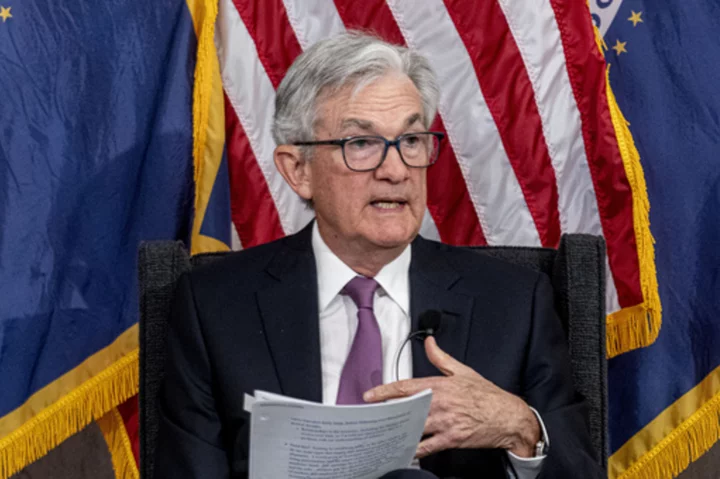WASHINGTON (AP) — Chair Jerome Powell indicated Friday that the Federal Reserve will likely forgo an increase in its benchmark interest rate when it meets in June for the first time since it began raising its key rate 14 months ago to fight high inflation.
In signaling so, Powell provided some clarity about the Fed's likely next policy move after a cacophony of speeches this week by central bank officials had clouded the picture.
“Having come this far, we can afford to look at the data and the evolving outlook and make careful assessments,” Powell said, referring to the Fed's 10 straight rate hikes, which have elevated its key short-term rate from near zero a year ago to about 5.1%, its highest level in 16 years.
Speaking at a Fed conference in Washington, Powell said the central bank's benchmark rate, which affects many consumer and business loans, is now high enough to restrain borrowing, spending and economic growth. Fed officials hope that slower growth will cool inflation over time.
Several Fed officials, in speeches this week, signaled support for suspending the rate increases based on the notion that the rate hikes haven't yet fully affected the economy and could take months to do so. Under that view, the Fed should take time to assess the consequences of its actions and avoid tightening credit so much as to trigger a recession.
On Friday, Powell seemed to endorse that approach, saying, “We face uncertainty about the lagged effects of our tightening so far.”
The Fed chair also suggested that “the risks of doing too much versus doing too little are becoming more balanced.” That marks a shift from earlier this year, when Powell often said the risk of raising rates too little to combat inflation outweighed the risk of raising them so high as to cause a deep recession.
Powell further noted that turmoil in the banking sector, after three large banks collapsed in the past two months, will likely cause banks to reduce the pace of lending, which could weaken the economy.
“As a result, our policy rate may not need to rise as much as it would have otherwise to achieve our goals,” he said. "Of course, the extent of that is highly uncertain.”
Comments from Fed officials this week had conveyed decidedly mixed messages about the central bank's likely next move.
Most of the policymakers signaled support for a pause at its next meeting. But several others expressed their belief that the Fed would have to further raise rates to curb persistent inflation. Lorie Logan, president of the Federal Reserve Bank of Dallas, said Thursday that inflation remained too high and that the latest economic data didn't yet justify a pause in hikes.
Inflation, under the Fed's preferred measure, has declined but remains far above the central bank's 2% annual target. Inflation was 4.2% in March, compared with a year earlier, though it is down from 7% last June.
But excluding volatile food and energy costs, so-called core inflation has slowed much less, from a peak of 5.4% in February 2022 to 4.6% in March. It has barely budged since November.
“The data have continued to support the (Fed's) view that bringing inflation down will take some time,” Powell said.
Not all Fed officials share Powell's concern that the upheaval in banking will harm the economy. Several Fed officials have suggested that the failure of Silicon Valley Bank and two others might have little impact.
Raphael Bostic, president of the Federal Reserve Bank of Atlanta, and Austan Goolsbee, head of the Chicago Fed, said this week that they haven’t seen lenders in their districts pull back on lending just because of the bank failures.
“I don’t know that we have a crisis right now in financial markets,” Bostic said. “We have a small number of institutions that had risk management strategies that work less well than you would like.”
Goolsbee, who spoke on a panel with Bostic, said that banks in his region have tightened credit because of the Fed’s rate hikes and not necessarily because of the bank failures.
but they haven’t gone further because of the bank failures.

